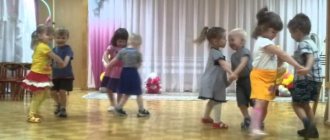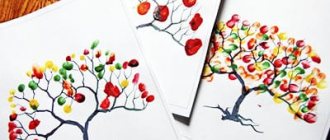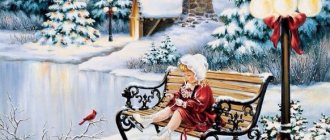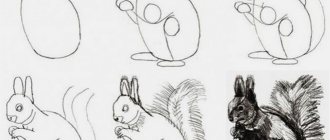Summary of a music lesson in the senior group. Journey to the autumn forest
Summary of organized educational activities “Journey to a fabulous autumn forest.”
Senior group Educational area : “Artistic and aesthetic development” Section : “Musical activity” Age group : senior (5 – 6 years) Compiled by: Yusupova L.D., music director of the highest qualification category This material will be useful to music directors, teachers of preschool educational institutions for organizing and conducting holidays, entertainment and music classes. The lesson notes have been developed for children of older groups (5 - 6 years old). Topic: “Journey to a fabulous autumn forest” Goal: to develop the creative abilities of preschool children. Objectives: Educational:
To form a musical culture based on familiarity with classical music.
To form children's vocabulary (thoughtful, gentle, lyrical), coherent speech and the ability to correctly construct sentences; activate speech, memory, logical thinking. Develop the skill of solo singing with musical accompaniment. Developmental:
Develop the skill of perceiving classical music through musical and rhythmic movements.
Develop the ability to identify a piece of music by its musical introduction. Develop breathing, pitch and rhythmic hearing; skill in playing children's musical instruments. Educational:
Create conditions for fostering a sense of mutual assistance, understanding and camaraderie.
Integration of areas: “Cognitive development”, “Socio-communicative development”, “Speech development”. Means of implementation: - laptop, stereo system; - tambourine; - toy bear; - flat carrots with a mirror according to the number of children; — yellow scarves for dance improvisation; - children's musical instruments. Preliminary work: - listening to the work “October. Autumn Song" from the album "Seasons" by P. Tchaikovsky; — acquaintance with the biography and work of V. Shainsky; — watching the cartoon “Shake!” Hello!"; - learning valeological songs with children - chants “Tryamdi-song”, “Good morning!” HE. Arsenevskaya; - learning songs “Song about us” by muses. S.V. Kaptyukhova, “Dear native land” music. T.V. Bokach. Repertoire: Listening – the play “October.
Autumn Song" music. P.I. Tchaikovsky. Play at the DMI – “Autumn Tale” lyrics. HE. Arsenevskaya. Chanting – valeological song – chanting “Good morning!” sl. and music HE. Arsenevskaya. Singing - “Song about us” music. S.V. Kaptyukhova; “Dear native land” muses. T.V. Bokach. MRD – dance “Friendship” bash.nar.mel. Musical game - “In the forest” music. etc. E. Senchenko Move.
I – Introductory part. Children enter the hall to the song “Smile” by the muses. V. Shainsky Musical director (hereinafter M.r.): Good morning, children! What's your mood today? Children: Good, kind. (Perhaps one of the children will say that they are in a bad mood) M.R.: I really want to inform you that today an unusual guest came to our kindergarten. V. Shainsky’s song “Clouds, white-maned horses” plays in the background
M.R.: Children, do you recognize him? Children: Teddy bear! M.R.: That’s right, the bear cub from the familiar cartoon “Shake!” Hello!" Bear: Hello, children, I'm so glad to meet you that I want to sing! M.R.: So let's sing and say hello to everyone with a cheerful song - the chant "Good morning!"
The music director and children perform a valeological song - the chant “Good morning!” sl. and music HE. Arsenevskaya Motivation. Bear: What a joyful song and you sang it amicably and cheerfully! Great!!! Children, I’m hurrying to the Hare’s birthday, I want to please him with a gift from the magical land of “Tili-mili-tryamdiy”! And he lives in a magical forest. But I’m a little scared to go alone, maybe you can join me in some friendly company?! M.R.: Children, what do you say, should we help Bear? Children: Yes! M.R.: Are we going on a journey? Children: Yes! M.R.: On the way, you and I will do a fun warm-up. Ralina will show us what movements we will perform and how: side step, side canter and hops. Demonstration of movements by a child. M.R.: Now we do everything together. Be careful. We will perform the movements rhythmically, expressively, to the music, and we will change movements at the signal of the tambourine. II – Main part. MRD “Fun warm-up” Children perform movements to the music, changing them at the signal of the tambourine:
- Jumping.
- Added step. - Side gallop. The teacher conducts individual work with children. Game at DMI. M.R.: So we came to the autumn fairy-tale and magical forest. And some adventures are already waiting for us! So these are the musical stumps that greet us, let’s sit down and relax after a long journey? Children: Yes! Educator: Children, do you want to amuse Little Bear and tell him a good musical fairy tale?! Children: We really want to! M.R.: I propose to play “Autumn Tale” in the orchestra. Take apart the instruments, and Little Bear will choose the conductor for us. Do you agree? Children: Yes, we agree! The bear chooses the conductor as a rhyme. Children take instruments and play them in accordance with the text under the guidance of a child conductor.
Orchestra “Autumn Tale” lyrics. HE. Arsenyevskaya, Russian Nar.mel. “Oh, you canopy” Bear: Thank you, children, I really liked your autumn fairy tale. Children place musical instruments on chairs - “stumps” and, together with the teacher and Little Bear, approach the music director. Hearing. M.R.: Look, children, how beautiful it is in the autumn forest. Even though late autumn has already arrived, the forest still pleases us with its beauty, birdsong and clean air, don’t you agree, children? Children: Yes! M.R.: Let's breathe. Breathing exercise “Breathing in the forest” Inhale through the nose, hands rise up and exhale through the mouth, hands down. M.R.: Children, let's sit down on the chairs and listen to the orchestra perform a fragment of the musical play “Autumn Song” by composer P.I. Tchaikovsky. Children listen to a fragment of P. I. Tchaikovsky’s play “October. Autumn Song." M.R.: Children, what did the music sound like? Children: Calmly, gently, affectionately. M.R.: What feelings does music convey? What natural phenomenon does the music tell about? Children: Music conveys sadness that summer is leaving, it’s getting cold, leaves are falling, winter is approaching. M.R.: “Autumn Song” is one of the best plays “The Seasons” by P.I. Tchaikovsky. Its melody is the most lyrical, gentle, thoughtful and a little sad, it talks about the fading beauty of autumn nature. Children, how can you convey your impressions of music? Children: You can draw a picture, read a poem or perform a dance. M.R.: That’s right, you want to depict the beauty of autumn nature with dance improvisation to the familiar play by composer P. I. Tchaikovsky “October. Autumn Song." Children: Yes, with pleasure! M.R.: Children, please tell us how you will move to the music? Children: Easy, on tiptoes, calm, gentle, lyrical, affectionate, smooth. Active listening.
The play “October” is performed. Autumn Song" by P. I. Tchaikovsky Children perform dance movements with scarves, and then put them in a basket. M.R.: Children, you very tenderly and lyrically depicted the fall of autumn leaves, did you like it yourself? Children: Yes! M.R.: And you, Little Bear? Teddy Bear: Very beautiful! But I felt sad that you are so wonderful, friendly, and my friend, the Hare, is still not around. M.R.: So here he is! Hare (child): Hello, Little Bear, glad to see you! Little Bear: Hello, Hare, I have a gift for you from the magical land of “Tili-mili-tryamdiy”! I'll bring it now. The little bear takes out a basket of carrots and gives it to the child, the hare. Hare: Carrots! Thank you, Mishka! But are they somehow unusual?!
M.R.: What a miracle?! Children, have you seen carrots like these? Children: No, we didn’t see it! Mr.: These are mirror carrots, you need to handle them very carefully. Little bear, what are they for? Little Bear: These are magic carrots, they help your tongue do gymnastics! And the tongue needs gymnastics in order to speak correctly and clearly. I have a lot of magic carrots, enough for everyone! Take it! M.R.: Okay, little bear, we understand you, we’ll take the carrots and start the gymnastics! Children, take the carrots and show the Bear what we can do with our tongues. Articulation gymnastics: “Fence”, “Cup”, “Turkey” M.r.: Thank you, Misha, for the funny carrots. We designed our reeds for singing. Children, maybe we can give the Bear and the Hare a gift? Children: Yes! Mr.: Place the carrots in the basket and sit down on the chairs. Singing. M.R.: Let's remember a familiar song and tell our friends about us. We listen carefully to the melody, take our time and pronounce the words clearly. The teacher gives instructions on correct posture: “Legs together, backs straight, so that the song sounds!” Children sing the song “Song about us” by music. S.V. Kaptyukhova M.R.: Children, what is this song about? What feelings does this music convey? Children: The song is cheerful, kind, listening to it, you want to rejoice and sing. M.R.: Misha, did you like the song? Little Bear: Yes, the children sang loudly, together, and I just wanted to sing with you. M.R.: Well, now I suggest you listen to the melody of the next song, and tell Little Bear what it’s called, who the composer is, what the mood of the song is. The musical director performs the song “Dear Land, Dear” by muses. T. Bokach Children express their opinions about the content and nature of the music. Children: A song about our Motherland, about the Republic of Bashkortostan. The nature of the music is affectionate, calm, kind, gentle, lyrical. M.R.: Children, do you want to perform it with soloists? Children: Yes! M.R.: Who wants to be a soloist? Come out, please. The teacher helps you choose soloists and gives instructions on correct posture. M.R.: Children, what will the soloists perform? Children: Verse. M.R.: What will the rest of the children perform? Children: Chorus. M.R.: Okay, right. We listen carefully to the introduction. Children perform the song “Dear Land, Dear” by muses. T. Bokach M.r.: Children, you all did your best, you sang the song expressively, tenderly, affectionately. They joined the song at the same time as the music started. Please tell us what else you can please our friends with?! Children: Play! Dance! Little Bear: How cool, and I want to dance! M.R.: Boys, invite the girls to dance. Educator: ......, please show me how we will perform the Bashkir dance movement: triple stomp. (Child demonstrates the movement) Educator: Now we do everything together. Be careful. We will perform the movements rhythmically and expressively. The back is straight, we don’t look at the floor, we keep the distance between the couples. Children perform the Polka dance Bashk.nar.mel. At the end of the dance, the boys escort the girls to their chairs and sit next to them. M.R.: Little Bear, our children sang and danced, but haven’t played yet. Children, do you want to play with the Hare and the Bear? Children: Yes! Educator: We know an interesting round dance game “In the Forest”. Children, join hands and start a round dance. We have a hare, we need to choose a cuckoo and a hedgehog. The teacher puts masks on the children. Children play the game "In the Forest" music. etc. E. Senchenko
III – Final part. M.R.: So our journey through the fairy-tale, magical forest has ended. Little Bear, we helped you meet the Hare, and it’s time for us to return to kindergarten. Children, did you like it in the forest? Children: I liked it very much! M.R.: What is your mood now? Children: Cheerful, joyful, sunny, kind, fabulous, good. M.R.: Let's remember what helped us get into the magical and fairy-tale forest today? Children: Fun warm-up, autumn fairy tale with musical instruments, songs, Bashkir dance, game. M.R.: In a word, wonderful music. And today you were very attentive, active and expressive. I wish you all a good autumn mood, love and take care of your native land, believe in fairy tales and love music. This is the one who will help us return to kindergarten! We set off on the way back, scattered like peas. Children perform the song “Autumn has come” by music. S. Nasaulenko Children and teacher sing “Goodbye” and leave the hall to the music.
We recommend watching:
Speech therapy lesson in the senior group on the topic: Autumn Lesson summary - excursions in the senior group of kindergarten. Journey to the autumn forest Summary of the lesson “Journey to the autumn forest” in the senior group Summary of the conversation on the topic Autumn in the senior group
Similar articles:
Summary of a lesson in the senior group on an autumn theme based on the fairy tale “Apple” by V. Suteev
Summary of a lesson in the senior group on the topic “Harvest, vegetables, fruits”
Summary of the GCD music lesson for the senior group “Music of Autumn”
Summary of GCD
"Music of Autumn"
Target:
develop children's creative abilities through musical activities through the activation of children's independent activities.
Tasks:
- cultivate a love of music and a desire to participate in the musical process;
— improve children’s motor activity and ability for creative imagination;
- consolidate vocal and singing skills;
- continue to work with rhythm cards;
- cultivate goodwill, the ability to take into account the interests and opinions of others;
- bring children the joy of communicating with music.
Children enter the hall to the cheerful music of any march. They disperse around the hall and say hello to the music (chanting “Hello”)
Music director:
I'm very glad to see you all. Guys, look,
With
This morning, I found an envelope on my piano. What could it be? (children's answers). I wonder if this letter is with happy news or sad? Let's see (opens the envelope, takes out a sheet of music). Strange, what is this?
M.R.:
Why did they send us these notes? What to do with them? (bring the children to ask to play the piano).
I play sad music on the piano. I ask about the character of this music, what it can tell us. We all come to the conclusion that the music is most likely sad.
Music director:
Look, something else is written here.
Do you want to know? This letter is from Autumn, she writes that in the magical forest where she lives, all the music has disappeared (probably these are the tricks of Baba Yaga).
The leaves cannot dance beautiful dances, the rain has stopped tapping out its rhythmic songs, the breeze has stopped singing completely. It became sad and boring in the forest without music. Everyone in the magical forest is sad, and now they don’t even know what to do. Autumn also writes that she sent us a package.
Together with the children, we find a box containing multi-colored leaves.
Music director:
Children, do you want to help Autumn and her friends? Then let's think about how we can help?
We reason that music lives in the music room, we can teach the leaves to dance again. We imagine how the leaves can dance (it is possible for several students to demonstrate the movements). I offer music to make the children dance with the leaves.
Musical composition for the development of creative imagination and dance movements “Autumn Mood”.
Music director:
Do you think we helped the leaves? Can we help the breeze?
When the breeze blows, what happens to the leaves? If we blow, how will the leaves move? (blow on leaves - breathing exercises).
I invite everyone to sit down on chairs together and sing the music of the breeze under the piano. (oo-oo-oo-oo...)





